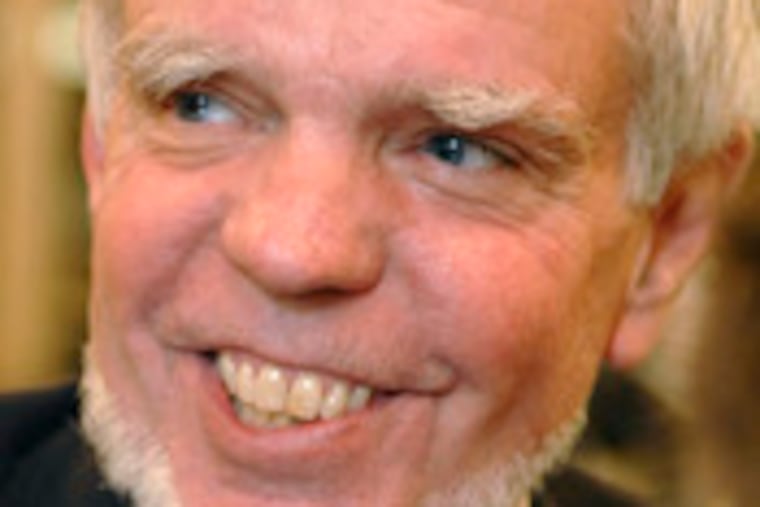A lawyer rests to sit in the sun
Thomas Gilhool wasn't a celebrity, but for 41 years he stood up for children, the disabled and the poor.

For 41 years, Thomas Gilhool was among this city's most influential lawyers. If you don't know the name, you're not alone.
He did not defend famous criminals or represent the rich. Instead, he stood at the bar for the poor, the children, the disabled. Now, at 69,
he's
standing down.
Gilhool "inspired a whole generation of lawyers as well as a
whole generation of law,"
said Richard Weishaupt, a senior attorney with Community Legal Services of Philadelphia
.
"He helped bring justice to groups that had never been valued."
Yesterday, hundreds of friends, colleagues and admirers gathered to salute him for the impact he made in his four decades with PILCOP, the Public Interest Law Center of Philadelphia.
The law center honored Gilhool with a daylong symposium at the Quakers' Arch Street Meeting House, followed by a dinner gala at the Downtown Club.
Gilhool's office at the center, where he was named chief counsel in 1975, will be dismantled in the fall, says new executive director Jennifer Clarke.
Technically retired since Jan. 1, Gilhool has been stopping by every few weeks "with a stack of papers and things he thought we should be doing. It's fantastic," she said.
Gilhool called his visits "a busman's holiday. I peek over people's shoulders and read their briefs. It's grand. I get the exhilaration of the work of this place without the pain connected with it."
The original plan for Gilhool's send-off called for a party, said Clarke. But when she discussed it with Gilhool, he insisted on adding a symposium - the organization's first such event since 1984. There were about 100 participants.
"Somebody suggested early on that I get one of those TV guys to be an emcee for a panel. That just wasn't Tom," Clarke said. "Instead of entertainment, he wanted to make it something meaningful and talk about issues."
Gilhool is all about issues. His work as lead counsel in two landmark cases led to major advances nationally in the treatment of the disabled.
In
Pennsylvania Association for Retarded Children v. Commonwealth of Pennsylvania
(1972), it was ruled that the state must guarantee a free public education to children with disabilities.
The case triggered 32 federal court decisions, with Congress enacting the Education for All Handicapped Children Act of 1975, now called the Individuals with Disabilities Education Act.
Halderman v. Pennhurst State School and Hospital,
originally brought in 1974, helped spur a national movement for the deinstitutionalizion of people with disabilities and led to the enactment of the Home and Community Based Services Amendment of 1981 to Title XIX of the Social Security Act.
The case held special meaning for Gilhool, an Upper Darby native and Yale Law School grad. His younger brother, Bob, was mentally disabled due to oxygen deprivation at birth, Gilhool says.
When their father died, Gilhool says he persuaded his mother to send 10-year-old Bob to Pennhurst in Spring City. Pennhurst was ordered shut down in 1987 amid allegations of abuse.
"I remember telling her it was just like a college campus, to my everlasting shame," he said. "We could have invented something, even then, to keep him at home." Now 64, Bob lives in a community home.
Gilhool twice ran for Philadelphia City Council - as an independent in 1969 in a special election to fill the seat of a deceased councilman, and two years later as an at-large Democrat in the primary. He lost both.
In the mid-1970s, he did a three-year stint as a law professor at the University of Southern California Law Center. He served as Gov. Robert P. Casey's secretary of education from 1987 to 1989, then taught eighth grade for a year at Philly's tough Vaux Middle School.
Weishaupt is "in a state of denial" about his mentor's retirement. He said the next Democratic president should appoint Gilhool to the Third Circuit Court of Appeals. "I bet Tom could be persuaded."
Not likely.
"Tom said he'd retire if I promised not to push him to do things," said Gillian, his wife of 44 years. "I don't think he'll need to. His favorite sport is sitting out in the sun. He can do that for a couple of years."
Or more, if it's up to him.
"You can't imagine the delight in having no deadlines, no responsibilities, no pressure. I'm going to read four newspapers a day and sit in the sun.
"It's time for the new generations."